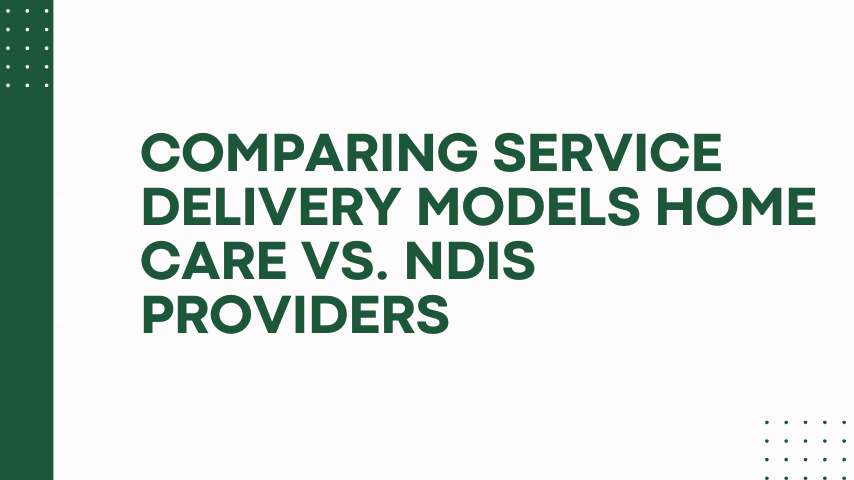If you were given the choice to opt between a home care agency or NDIS service providers, who would you pick? Comparing each service delivery model can be a concern when your goals are united but there is no base of your decision.
Choosing a service delivery model that is right for your disability needs and goals, and adapts well to future needs should serve the decision. For this reason, comparing services covered under a home care agency and support from NDIS support workers will shape the choices for treating your specific disability.
In this blog, we will compare the service delivery models of both independent running agencies, highlighting their unique approaches, services, and end results for disability treatments.
Defining Service Delivery Models
Before comparing the two different service delivery models, let’s first understand the meaning of service delivery model.
A service delivery model is a method that disability care providers use to manage and deliver services to disabled individuals. Choosing one service delivery model matters as it influences the type of care you will receive.
If you are a person with a disability, you must aim for a model that reduces the impact of disability, meets your personal needs, and future goals. In Australia, home care agencies and NDIS service providers are two of the prominent providers. Let’s get an overview of their service models.
Overview of Home Care Service Model
Beginning with a home care agency, their model is primarily for individuals with a disability who want to receive care and comfort in their place. They aim for personalised assistance to make their clients feel independent, healthy, and a sense of achieving personal goals.
This service model is suitable if you are elderly, recovering from illness or surgery, or dealing with severe disabilities.
Type of Services You Will Receive:
Home care agencies offer various services like personal hygiene, medications, and day-to-day living tasks.
-
Personal Care:
Under this service, disability support providers assist in toileting, bathing, dressing, and grooming.
-
Medical Support:
In this support, you can expect the provider to manage your medications. They set reminders for the scheduled time of medicines and number of doses, nurse your wounds, and coordinate with your primary healthcare provider to see the progress.
-
Companionship:
In this service, you get emotional support to overcome the feelings of depression and isolation. Also, the support workers plan in-home social activities to improve your overall health.
-
Household Tasks:
Besides above support, you receive help in household chores, preparing meals, and grocery shopping.
Customised Approach:
Home care agencies are more inclined towards working as per your lifestyle and health requirements. For this reason, apart from offering one-to-one daily assistance, they are flexible with your routine too.
Whether you need care for a few hours each week or require round-the-clock support, disability support providers personalise the assistance.
Overview of NDIS Provider Service Model
Next, moving on to the NDIS provider, it is primarily an independent organisation that complies with the National Quality and Safeguards Commission. This involves adhering to NDIS regulations, pricing guidelines, and maintaining insurance if the provider offers specific support.
Unlike in-home services, their offerings are structured with the flexibility to choose provider’s accommodation facilities or home to receive services. Their service model is suitable for adults over 18 and elderly below 65 with chronic disabilities looking for NDIS assistance.
Types of Services You Will Receive:
NDIS Disability providers aid in support coordination, skill development, and community participation beside basic healthcare services.
-
Support Coordination:
Under this service, you can expect disability support providers for guidance on the NDIS, its funding, and coordination plans.
-
Skill Development:
Under this service, you will receive training and guidance on budgeting, public transports, business, employment, behaviour changes, and hobbies.
-
Community Participation:
In this support, you can engage in centre-based social activities and attend community events to develop social skills.
Community-Based Approach:
NDIS providers focus on building a community where people with disabilities feel included and independent. They understand the united goals of living a fulfilling life for people with disabilities and aim to engage members with social and recreational activities. Their approach is to break barriers, eliminate social stigma, and empower disabled people in their community.
Final Words
We hope you found this blog useful. We began with outlining the meaning of the service delivery model and why it matters. We also explained each of these models to make a person with a disability choose a better approach and service for their needs.
In the end, we compared home care and NDIS service providers on the basis of their approaches to help you choose the right care model for your specific disability needs and goals. If you are choosing an NDIS provider already, choose a provider who can offer the best of both worlds.
